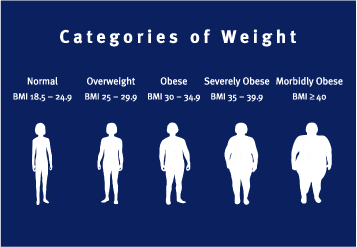What is BMI?
-
- BMI (Body Mass Index) is a measurement of body fat based on height and weight that applies to both men and women between the ages of 18 and 65 years. BMI can be used to indicate if you are overweight, obese, underweight or normal. A healthy BMI score is between 20 and 25. A score below 20 indicates that you may be underweight; a value above 25 indicates that you may be overweight.
People whose BMI is within 18.5 to 24.9 possess the ideal amount of body weight, associated with living longest, the lowest incidence of serious illness, as well as being perceived as more physically attractive people than persons with BMI in higher or lower ranges. However, it may be a good idea to check your Waist Circumference and keep it within the recommended limits.
Note: Since Body Fat Percentage calculations use total body weight and not estimates of lean muscle mass and fat, BMI can not determine between the overweight and the more muscular. Use our Body Fat Calculator and Waist to Hip Ratio Calculator in combination with our BMI Calculator for a more accurate view of your body fat. Click Here To Calculate Your BMI
For those of you using Metric, calculate your BMI by your weight in Kilograms / (Height in Meters x Height in Meters)
Crab this BMI widget here
My BMI is currently 20. If you are trying to lose weight, don’t worry so much about what the scale says. As long as your BMI for your height and current weight is below 25, you’re probably all set. If your BMI is over 25, you should consider starting an exercise regime or weight loss program like Sensa.

So is BMI really that important? The answer is yes!
If your BMI is 32, don’t worry, you probably won’t up and die tomorrow. You may however want to think about changing your lifestyle a bit before one of your organs gives out on you.
BMI is just one of many factors related to developing a chronic disease (such as heart disease, cancer, or diabetes). Other factors that may be important to look at when assessing your risk for chronic disease include:
-
-
- * Diet
-
- * Physical Activity
-
- * Waist Circumference
-
- * Blood Pressure
-
- * Blood Sugar Level
-
- * Cholesterol Level
-
-
- * Family History of Disease
Remember, while a BMI calculator is a very helpful tool, it can’t replace your doctor. If you used the BMI calculator I linked to above and you realize you are in the obese category, I recommend immediately talking to your doctor and starting a diet and exercise program.
Is Being Plus-Size en Vogue? Not really.
 There is nothing wrong with being “Plus Size” other than the fact that it’s unhealthy. No, not everyone who is plus sized is unhealthy, but being overweight will lead to problems eventually, no matter which way you cut it. Stop making excuses and do something about it. It’s not about what you look like, it’s about taking care of yourself and taking good care of your body.
There is nothing wrong with being “Plus Size” other than the fact that it’s unhealthy. No, not everyone who is plus sized is unhealthy, but being overweight will lead to problems eventually, no matter which way you cut it. Stop making excuses and do something about it. It’s not about what you look like, it’s about taking care of yourself and taking good care of your body.
If you need help, there are many wonderful programs out there that are easy to stick with. I personally recommend the Sensa Weight Loss Program in conjunction with a healthy diet of good food. For exercise, I personally like the The Quick Fit System. Keep in mind that everyone is different and what works for one person, might not be right for another person.
Some other programs I’ve heard good things about is Weight Watchers and Winsor Pilates Fat Burning System. If you need help or have suggestions for other women trying to lose weight, please leave a comment!



